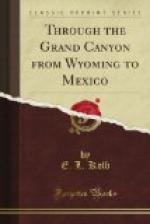In the consul I found a young Spaniard, all affability, bows, and gestures; and without being conscious of it at first I too began making motions. He deplored my lack of knowledge of the Spanish language, laughed at any suggestion of trouble, as all trouble was in Eastern Sonora, he said, separated from the coast by two hundred miles of desert, and stated that the non-resident owner of the La Bolsa cattle ranch happened to be in the building at that moment. In a twinkling he had me before him and explained the situation. This gentleman, the owner of a 600,000-acre grant, and the fishing concession of the Gulf, stated that the ranch drove a team to Yuma once a week, that they would bring me back; in the interval I must consider myself the guest of the Rancho La Bolsa. The consul gave me a passport, and so it was all arranged.
In spite of the consul’s opinion, there were many whispered rumours of war, of silent automobiles loaded with firearms that stole out of town under cover of the night and returned in four days, and another of a river channel that could be followed and was followed, the start being made, not from Yuma, but from another border town farther west. A year before there had been an outbreak at this place of certain restless spirits,—some whites included,—and they went along the northern line of Mexico, sacking the ranches and terrorizing the people. The La Bolsa ranch was among those that suffered. The party contained some discharged vaqueros who were anxious to interview the ranch foreman, but fortunately for him he was absent. Then they turned south to Chihuahua and joined the army of Madero. War, to them, meant license to rob and kill. They were not insurrectos, but bandits, and this was the class that was most feared.
Meanwhile I had not given up the idea of a possible companion. Before coming to Yuma I had entertained hopes of getting some one with a motor boat to take me down and back, but there were no motor boats, I found. The nearest approach to a power boat was an attempt that was being made to install the engine from a wrecked steam auto on a sort of flat-bottomed scow. I heard of this boat three or four times, and in each case the information was accompanied by a smile and some vague remarks about a “hybrid.” I hunted up the owner,—the proprietor of a shooting gallery,—a man who had once had aspirations as a heavy-weight prize fighter, but had met with discouragement. So he had turned his activities to teaching the young idea how to shoot—especially the “Mexican idea” and those other border spirits who were itching for a scrap.
The proprietor of the shooting gallery drove a thriving trade. Since he had abandoned his training he had taken on fat, and I found him to be a genial sort of giant who refused to concern himself with the serious side of life. Even a lacing he had received in San Francisco at the hands of a negro stevedore struck him as being humorous. He did not seem to have much more confidence in his “power boat” than the others, but said I might talk with the man who was putting it together, ending with the remark “Phillipps thinks he can make her run, and he has always talked of going to the Gulf.”




